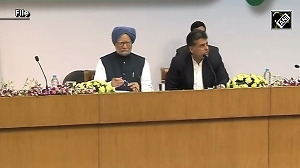"India has all the ingredients of a knowledge-based economy by virtue of its human resource strength," said Ajay Dua, secretary, Department of Industrial Policy and Promotion, at a session 'FDI: Boom times ahead.' The session was held in the India Economic Summit 2005, jointly organised by the Confederation of Indian Industry and the World Economic Forum in Delhi on Monday.
Dua said that among the 102 countries listed in World Economic Forum, India ranks third as far as availability of engineers and scientists is concerned, its quality of management schools comes eighth, its educational institutions are ranked 28, while the quality of its research institutions stands at 20.
Foreign direct investment, which is a global buzzword, has somehow not been able to attract as much investment in India as it should have due to old suspicions and archaic laws. But anymore delay in opening out would be disastrous as China, its nearest competitor in Asia, has already overtaken India.
Jim Goodnight, chief executive officer, SAS, USA and co-chairman of the India Economic Summit, said that India was lagging behind in inviting FDI despite its strong points -- a strong economic base, an enviable IT manpower and low labour cost compared to the United States.
Dua admitted that India had not been able to attract as much FDI as it should have but 'things are changing.'
Highlighting the strong points of the Indian economy, Dua said that India had maintained a growth rate of 6 per cent in the last ten years of which the services sector had over 50 per cent share in GDP and manufacturing sector had grown at 8.8 per cent in 2004-05, accounting for 17.4 per cent share in 2004-05.
The FDI policy, he pointed out, was evolving in a big way since 1991 and more and sectors had been opened up to FDI while the equity caps in the existing ones were being raised and procedures were being simplified. He pointed out that up to 100 per cent investment through the automotive route in almost all sectors (barring a few) had already been opened up in 2000.
"New sectors that have been opened up to FDI in 2004-05 are defence production, insurance and print media, and e-governance has become a way to ensure transparency in the working of the government and to speed up efficiency," he said.
From June 2004, FDI in domestic airlines had been increased from 40 per cent to 49 per cent and FDI up to 100 per cent under the automatic route had been allowed in development of townships, housing and construction of development projects, he said. The telecom sector had been another major attraction for the FDI where the limit had been raised to 74 per cent, he pointed out.
Dua admitted that there are problems in clearance of projects which cause irritation but major initiatives have been taken to improve this scenario. Under the National e-governance Action Plan, projects have been undertaken by the Centre and the state governments to ensure transparency and efficiency.
One of the most important initiatives taken by the government to remove many of these misgivings has been the passage of the Rights to Information Act which should go a long way in assuring foreign investors that they are welcome to work in India without any hindrance, he said.






 © 2024 Rediff.com -
© 2024 Rediff.com -